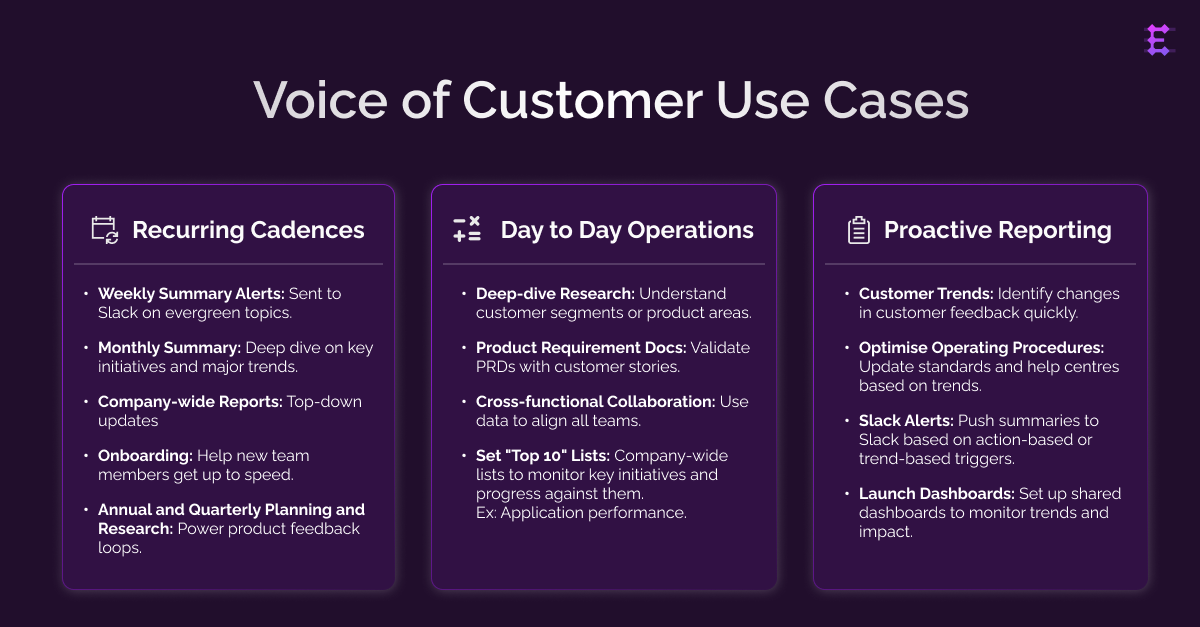Everything You Need to Know About Voice of Customer Maturity Model with Enterpret
Enterpret is a Unified Customer Feedback Platform used by leading used by leading product orgs like Canva, Notion, Loom, Linear, and Descript to accurately leverage the Voice of Customer in building best-in-class products.
At Enterpret, we work with the most innovative customer-centric companies like Canva, Loom, Notion, and Apollo.io to build their Voice of Customer (VoC) programs.
The Enterpret Maturity Model is a playbook inspired by many lessons we’ve gathered by collaborating with these teams to build and support their VoC programs. This model can be used as your guide for establishing a Voice of Customer program or want to find ways to up-level your VoC program.
What is a Voice of Customer program?
The best products are built by continuously talking to customers and using insights from those conversations to solve customer problems. Over and over again.
A Voice of Customer program ensures companies are collecting every customer interaction and transform these into insights that can be used to solve problems and build great products.
Many teams we talk to are still looking to understand what a good Voice of Customer program looks like. With the rise of generative AI, starting a Voice of Customer program is easier than ever but also more critical to get right as customer expectations of products and the teams that build them continue to grow at a rapid pace.
Voice of Customer is a Team Sport
When it comes to managing and acting on customer feedback, there are two types of stakeholders:
Insight Producers: Align your entire company around the top pain points customers are facing
Insight Consumers: Insight consumers take action based on customer feedback insights
| Insight Producers Responsibilities | Insight Consumers Responsibilities | |
|---|---|---|
| Coordinate readouts to the entire organization with data to show customer pain points by segment | Accelerate your development process by bringing development teams closer to customers | |
| Quarterly retrospectives to measure the impact of major company initiatives | Self-serve insights from customer feedback, removing user research as a bottleneck to product development. | |
| “Always on” lists by development pod | All work should be grounded in real customer stories | |
| Go-to person for research and customer insights |
Align your organization around the Voice of Customer
When we talk about VoC, we focus on highlighting the customer benefits.
There’s another core benefit of VoC that drives collaboration between the folks building the products for customers by aligning them around insights.
The Voice of Customer Maturity Model - is your team actually using customer feedback to build products?
Every company is running some form of a Voice of Customer program - even if you don’t call it that.
If you’re collecting feedback in a support tool, running surveys, or listening to what customers are saying about you on social media, you’re stitching together some form of Voice of Customer.
The question to ask is, “How good are we at using customer feedback to build products?”
The Voice of Customer Maturity Model
The Enterpret Voice of Customer Maturity Model helps teams calibrate where they are in their VoC journey.
Step 0: Care about your feedback
Have you delivered a feature/product because of customer feedback? When was the last time? What was it?
Step 1: Quantify customer feedback
Do you prioritize delivering features/products using quantified metrics of customer feedback?
Step 2: Automate the process
How long did it take you to make that report? How many different sources were you able to consider?
Step 3: Decentralize access to insights
You have quantified insights. How quickly is your team able to access these, learn, and execute?
Step 4: Unified Multi-modal feedback
Do your product builders have access to all the different channels of communication?
Step 5: Business impact of customer feedback
Link feedback to business impact (revenue, churn risk, etc)
Closing the Loop
Across all steps, it is important to “close the loop” after feedback has been actioned. Let your customers know when you’ve heard their feedback and taken it into action. How often do you reach back out to your customers after you’ve built something they’ve asked for?
What does Voice of Customer look like?
When implemented, Voice of Customer is useful in many ways, which can be organized into three categories:
Recurring Cadences
Day to Day Operations
Proactive Reporting
Voice of Customer Use Cases
Recurring Voice of Customer Use Cases
Weekly summary alerts configured and sent to Slack on evergreen topics
Monthly summary deep dive on key initiatives and major trends
Company-wide, top-down report
New team member onboarding
Annual/Quarterly planning and research
Day to Day Voice of Customer Use Cases
Deep-dive research on specific customer segments or product surface areas
Product requirement docs should be validated by customer stories
Cross-functional collaboration
Company-wide “Top 10” lists to monitor key initiatives and progress against them (ex. Application performance)
Proactive Reporting Voice of Customer Use Cases
Changes in trends of customer feedback identified early
Update standard operating procedures and help centers based on recent trends
Summaries pushed to Slack proactively
Shared dashboard for launch team to monitor trends and impact
Building your Voice of Customer Strategy
At Enterpret, we believe having a Voice of Customer strategy in place helps teams to never lose sight of who you're building for. Feedback is invaluable and listening actively and iterate swiftly on feedback helps teams to exceed customer expectations.
At Enterpret we support teams in building out their Voice of Customer programs by:
We’ll continue to refine the model as technology and companies continue to evolve. If you have any thoughts on this - we’d love to know!
And, if you want to build a Voice of Customer program and want some help get in touch - we’d love to share how Enterpret can help.





